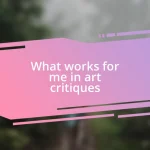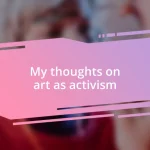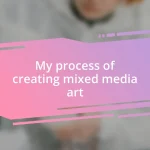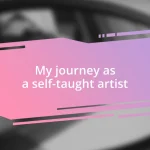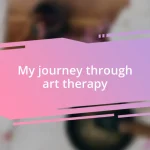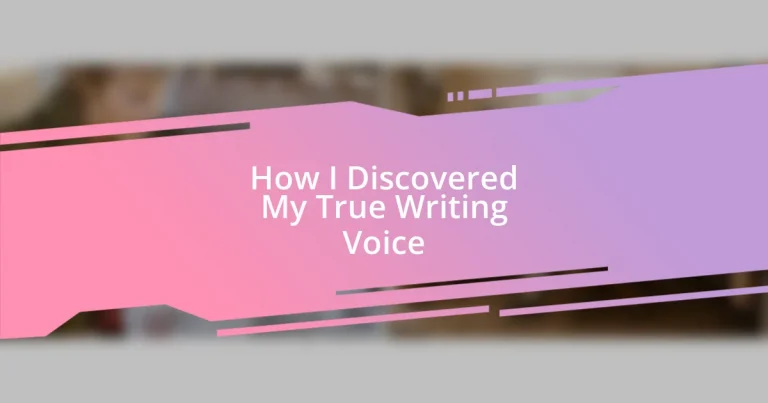Key takeaways:
- Embracing authenticity over imitation was a pivotal moment in the author’s journey, highlighting the importance of personal experiences in shaping one’s writing voice.
- Participating in supportive writing groups and sharing work helped the author confront self-doubt, revealing the collective strength of writers facing similar insecurities.
- Experimenting with genre blending and accepting imperfections enriched the author’s unique style, demonstrating that vulnerability and quirks can enhance relatability in writing.
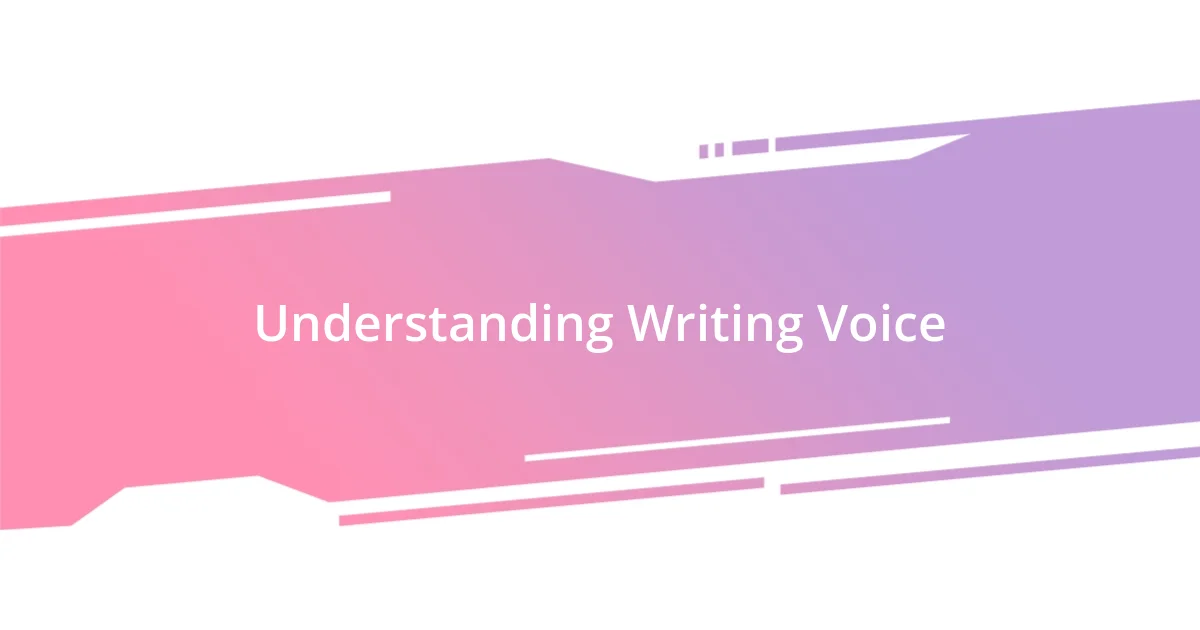
Understanding Writing Voice
Writing voice is the unique personality that shines through your words; it’s how you connect with readers at a deeper level. I remember when I first realized that my voice was distinctly mine—a moment of clarity during a late-night writing session when I stumbled upon a phrase that just felt right. Have you ever experienced that spark, when the words flow effortlessly, almost as if they’re speaking for you?
Understanding your writing voice involves embracing your quirks and style, warts and all. I often reflect on how my reluctance to conform to traditional formats made my writing stand out. Some might find it daunting, but isn’t it exhilarating to express your true self without the fear of judgment? That realization that my imperfections made my work more relatable was a game-changer for me.
Finding that voice can be a journey, often through trial and error. There were times when I mimicked writers I admired, only to feel disheartened when it didn’t feel right. In those moments, I learned that authenticity trumps imitation. You might ask yourself: what stories do you want to tell, and how can your unique perspective shape those narratives? Embracing those questions can lead you to a richer, more authentic writing experience.
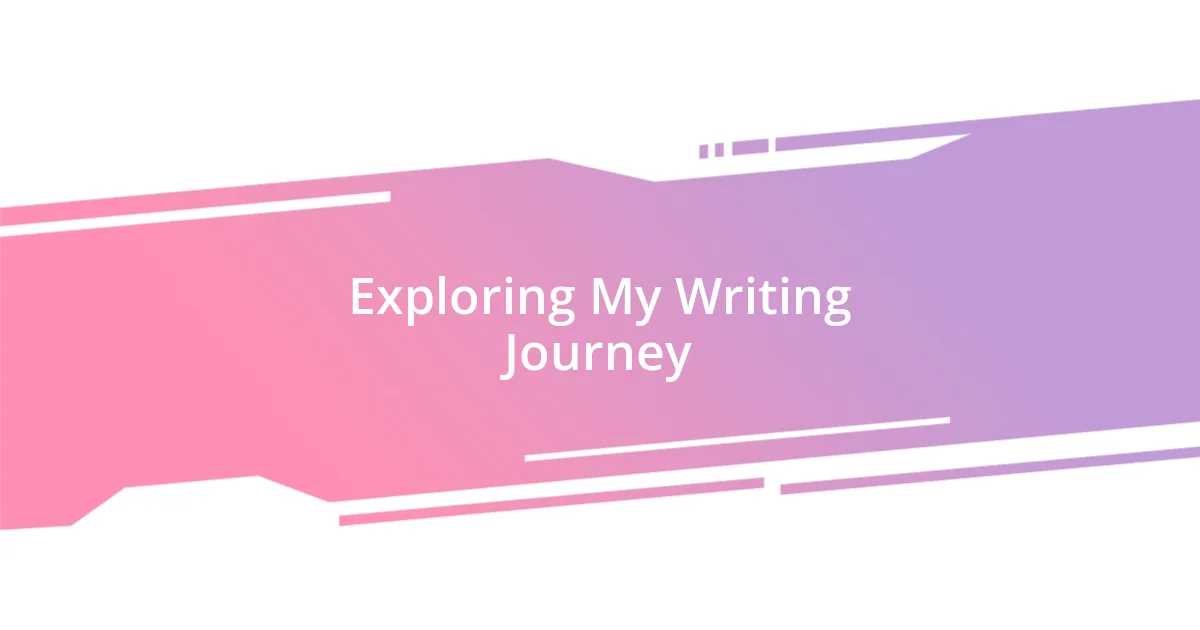
Exploring My Writing Journey
My writing journey began in high school, when I penned my first short story. I remember sitting in the library, surrounded by the quiet hum of creativity, and suddenly feeling bold enough to share my thoughts. Sharing that story not only boosted my confidence but also ignited a passion for storytelling I didn’t know I had.
As I moved through college, I faced significant hurdles in defining my voice. I tried to emulate the writing styles of my professors, convinced that their authority warranted imitation. Looking back, I realize how stifling that was, yet it taught me a valuable lesson about authenticity. I often chuckle now at how my initial attempts were like wearing borrowed clothes; they simply didn’t fit right. The struggle of finding my own style was both frustrating and liberating.
Eventually, embracing vulnerability became key. I started incorporating personal anecdotes into my work—tales of love, loss, and growing pains. In one particular piece, I wove a story about my grandmother’s unwavering support, and the feedback I received was overwhelmingly positive. Connecting with readers through my genuine experiences broke down barriers, allowing me to understand that my voice was not just unique; it was a reflection of my journey.
| Aspect | My Writing Journey |
|---|---|
| Starting Point | High school short story in the library |
| Challenges Faced | Imitating professors’ styles, feeling stifled |
| Key Learning | Authenticity over imitation |
| Breakthrough Moment | Sharing personal anecdotes, emotional connection with readers |

Analyzing Influential Writers
Analyzing influential writers has always been a fascinating part of my journey. I can still recall the first time I read Maya Angelou’s I Know Why the Caged Bird Sings. Her raw honesty and powerful narrative voice left an indelible mark on me. I realized that every writer has a unique voice shaped by their experiences, culture, and emotions which, in turn, reflects their authenticity.
To illustrate the diversity among influential writers, consider these aspects:
- Unique Style: Ernest Hemingway’s succinct prose versus Virginia Woolf’s lyrical depth.
- Cultural Influence: Chimamanda Ngozi Adichie’s storytelling rooted in Nigerian history and identity.
- Personal Experiences: Jack Kerouac’s spontaneous style inspired by his life on the road.
- Emotional Power: Toni Morrison’s ability to weave complex themes of race and identity into a captivating narrative.
- Innovative Techniques: Mark Twain’s use of dialect to bring characters to life and ground them in their environments.
Each writer’s journey offers invaluable lessons. Analyzing their work helped me recognize and embrace my own voice, as I learned that vulnerability and authenticity are crucial components of compelling storytelling.
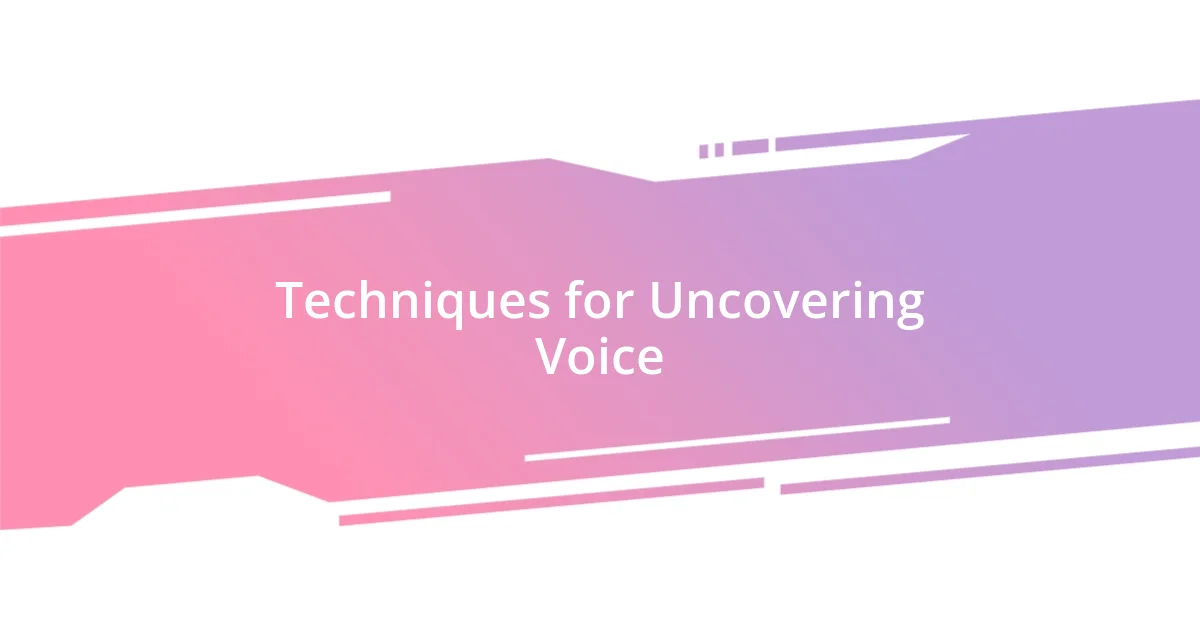
Techniques for Uncovering Voice
When it comes to uncovering your writing voice, freewriting can be a transformative technique. I remember sitting at a coffee shop, where the chatter faded into a comforting background noise. I allowed my pen to flow without judgment, jotting down thoughts that surfaced from the depths of my mind. It was liberating! In those moments, I discovered phrases and styles I never knew existed within me. Have you tried this? You’ll be surprised at how unfiltered writing can reveal patterns and tones that resonate with your true self.
Another technique that worked wonders for me was reading widely and diversely. I’ve found that immersing myself in different genres and styles expanded my horizons. There were nights spent devouring poetry, fantasy novels, and memoirs, each offering a unique rhythm and cadences. One evening, while lost in a poem by Rumi, I felt a spark—his lyrical quality inspired me to play with my own words in a more fluid, poetic manner. I began to realize that my voice is a canvas, painted with influences from various writers. Have you considered how different authors can inspire your own voice?
Finally, feedback plays a pivotal role in discovering your voice. I recall sharing my work with a close friend who was honest yet encouraging. She once pointed out how my passion for nature seemed to seep into my descriptions, making my writing vibrant and alive. That realization was a game-changer; it taught me the importance of embracing those elements that feel intrinsic to who I am. How do you handle feedback? Engaging with trusted readers can guide you towards uncovering aspects of your voice you might be too close to see.
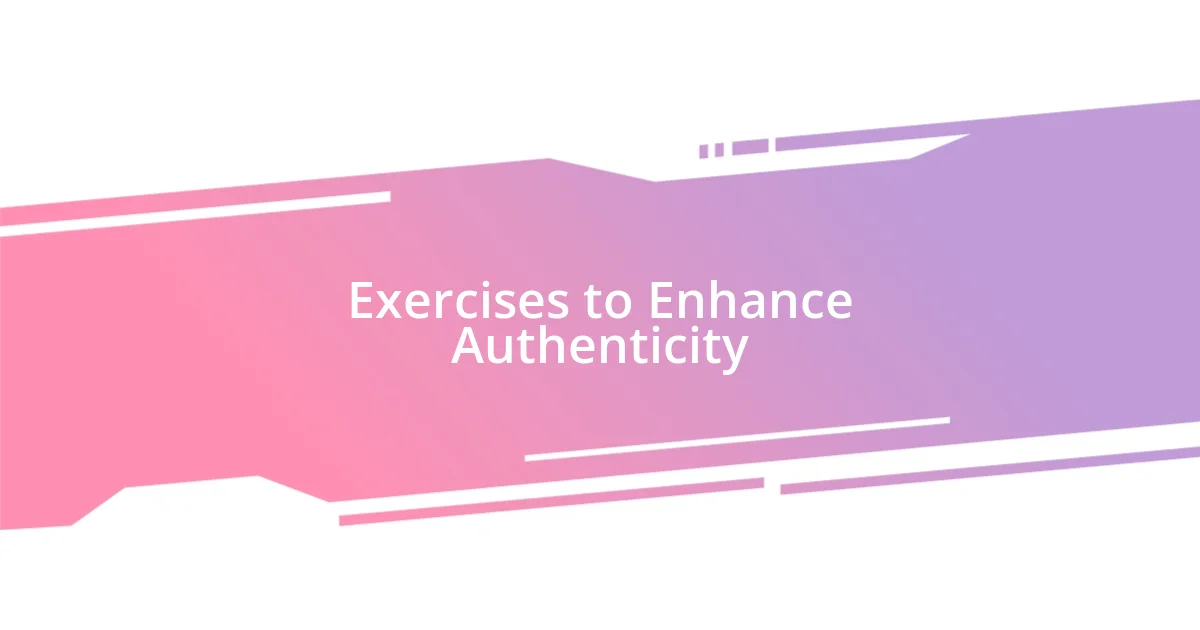
Exercises to Enhance Authenticity
One exercise that has greatly enriched my authenticity is journaling about my daily experiences and emotions. I remember a particularly rainy afternoon when I decided to write about my feelings during a thunderstorm. The rhythmic pitter-patter of rain felt cathartic, and as I poured my thoughts onto the page, I tapped into a deeper emotional truth. Have you ever noticed how such ordinary moments can unlock profound insights? Reflecting on everyday life can reveal layers of your voice you might overlook in structured writing.
Another effective method is revisiting childhood stories—the ones that shaped who you are today. I often think back to how I used to create elaborate tales in my backyard, using sticks as swords and claiming kingdoms. Recalling those innocent moments not only brings a smile to my face but also allows me to access that pure creativity untainted by the expectations of adulthood. How has your childhood influenced your writing? Embracing that playful spirit can help you uncover authentic elements of your voice amidst the pressures of adult life.
Lastly, consider tackling prompts that push you into uncomfortable territory. One time, I wrote a piece from the perspective of someone entirely different than myself. This exercise was challenging but ultimately exhilarating. I felt as if I were stepping into new shoes and exploring a realm outside my comfort zone. Have you pushed your boundaries in your writing? Daring to explore unfamiliar perspectives can illuminate aspects of your own voice that were waiting to be discovered.
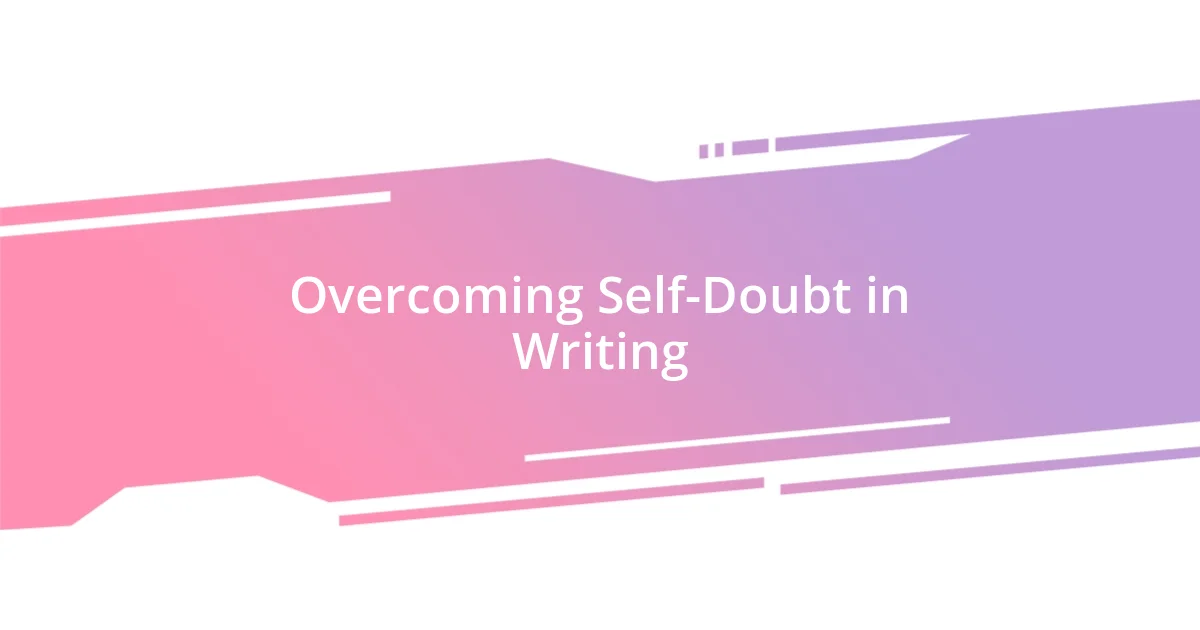
Overcoming Self-Doubt in Writing
When I first started writing seriously, I battled intense self-doubt. I vividly remember staring at a blank page, my mind racing with thoughts like, “What if nobody wants to read this?” It was paralyzing. But then I realized something fascinating: those very doubts were part of my journey. Instead of letting them consume me, I began to view them as clues about what I truly valued in my writing. Have you ever noticed how doubts can reveal the topics and moments that matter most to you?
I also found that sharing my work with others helped me confront my insecurities head-on. Initially, I was terrified of criticism, fearing it would validate my self-doubt. However, one day, I participated in a local writing group. We each read our pieces aloud, and something magical happened. The support and encouragement I received made me recognize that every writer faces uncertainty. It reminded me that our stories connect us, and the act of sharing can transform self-doubt into collective strength. Has sharing your work ever made you feel less alone in your struggle?
Meditation and mindfulness became invaluable tools in overcoming self-doubt. On particularly challenging days, I took time to sit quietly, focusing on my breath. This practice taught me to observe my thoughts without judgment. I vividly recall one session where a wave of anxiety washed over me, whispering, “You can’t do this.” But rather than shying away from that feeling, I sat with it. That moment of acceptance shifted my perception; I understood that self-doubt might never fully vanish, but it didn’t have to control my writing. How do you cope with those nagging thoughts? Embracing them might just lead you to stronger, more authentic writing.

Embracing My Unique Style
Embracing my unique writing style felt a lot like peeling back the layers of an onion. There was a moment during a writing workshop when I shared a story in my casual voice, filled with quirks and humor. As the laughter rolled in, I realized that my authentic self resonated with others. Have you ever felt that rush when your true voice is recognized? That experience taught me the power of being unapologetically me.
I often experimented by blending different genres, merging poetry with prose in ways that felt spontaneous and fresh. There’s a particular piece I wrote inspired by a serendipitous encounter in a coffee shop, where I turned a simple conversation into a poetic dialogue. The feedback I received was overwhelming. Have you explored surprising combinations in your writing? It turns out that mixing styles can create magic, unveiling a voice that’s distinctively yours.
Ultimately, leaning into my quirks became a lesson in acceptance. I recall a time when I decided to leave in the little mistakes, the typos that made my writing feel more human. My friends often joke that it’s my “charm,” but really, it was a revelation. The more I embraced imperfections, the more relatable my writing became. How might your unique quirks elevate your work? By allowing my authentic self to shine through, I discovered a richness in my voice that I’d never anticipated.

